Related Research Articles

"Bye, Bye, Baby " is a popular song written by Bob Crewe and Bob Gaudio, a member of The Four Seasons, whose version of the song made it to No. 1 in Canada and No. 12 on the US Billboard Hot 100 in 1965. On the original issue of the single, the title was "Bye Bye Baby"; on the album The 4 Seasons Entertain You, the name was changed to the longer, more familiar name. The song is about saying goodbye, not because the person is unloved but rather because the relationship is adulterous.
"Hold Me Close" is a pop song written and performed by English singer and actor David Essex. The song was released in October 1975, and reached the number one position on the UK Singles Chart, where it remained for three weeks.

"January" is a pop rock song recorded by Scottish rock band Pilot. Written by David Paton and produced by Alan Parsons, "January" was the sole number-one single in the UK for Pilot, coincidentally going to the top of the charts on 26 January 1975. It stayed at number one for three weeks.
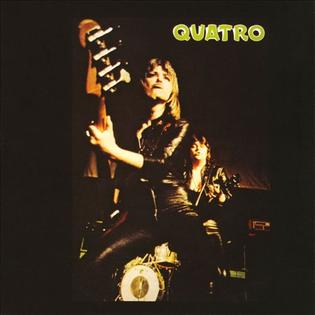
Quatro is Suzi Quatro's second album, released in October 1974 by Rak Records as SRAK 509, with the exceptions of the United States and Canada, Japan and several territories in Europe.

Sherbet's Greatest Hits (1970–1975) was a compilation album released on Infinity Records in Australia in July 1975, at the height of Sherbet's popularity in Australia. It spent 1 week at the top of the Australian album chart in 1975.
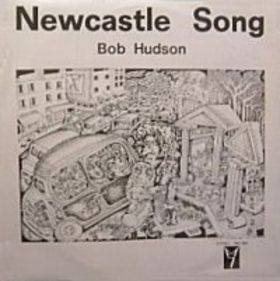
"The Newcastle Song" was a 1975 hit for musician and comedian Bob Hudson. It poked fun at the working-class youth culture of the city of Newcastle, New South Wales, Australia. The song was recorded in front of a live audience in 1974. It became a number-one single in both Australia and New Zealand.
"Can't Stop Myself From Loving You" was a song written by ex-Easybeats members Harry Vanda & George Young in 1974 and was recorded by Johnny Cave, aka stage act William Shakespeare. It was Shakespeare's first hit in Australia, making the number 2 spot on the Australian charts. The song was largely aimed at the teenybopper market.
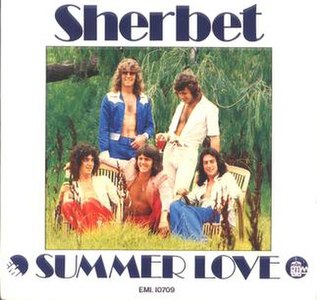
"Summer Love" is a song by Australian pop group, Sherbet and was released in March 1975. It became their first number-one hit on the Australian Kent Music Report Singles Chart. The song was promoted on the newly aired ABC TV pop series, Countdown, which gave it wide exposure. From early 1975 the group made more appearances on the show than any other band in the programme's history. In October, at the King of Pop Awards, "Summer Love" won the Most Popular Australian Single, the band won Most Popular Australian Group and their lead singer, Daryl Braithwaite, won the King of Pop award.

"Help Is On Its Way" is a song by Australian band Little River Band, released in April 1977 as the lead single from the group's third studio album, Diamantina Cocktail. The song peaked at number one on the Australian Kent Music Report singles chart. The song also peaked at No. 14 on the Billboard Hot 100.

Slipstream is the third studio album by Sherbet released in September 1974 and it peaked at No. 3 in Australia and was certified gold.
"Just to Be Close to You" is a song by American R&B/funk band, Commodores, in 1976. Released from their album, Hot on the Tracks, it would become one of their biggest hits, spending two weeks at the top of the Hot Soul Singles chart and becoming their second Billboard Hot 100 top ten, peaking at number seven. The song was written and sung by Lionel Richie.

Brian Cadd is the debut self-titled album by Australian musician Brian Cadd. It was released on the Bootleg Records label in 1972 and peaked at number 3 for three weeks on the Australian Go-Set chart. It contained the hit single "Ginger Man".

"My Boy" is a popular song from the early 1970s. The music was composed by Jean-Pierre Bourtayre and Claude François, and the lyrics were translated from the original version "Parce que je t'aime, mon enfant" into English by Phil Coulter and Bill Martin.
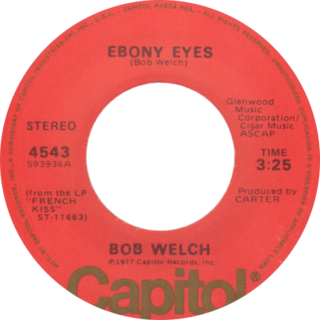
"Ebony Eyes" is a song written and performed by Bob Welch. The song was the second single release and second hit song from his album French Kiss. Backing vocals are provided by Juice Newton.
The discography of Australian rock and pop singer-songwriter Daryl Braithwaite.
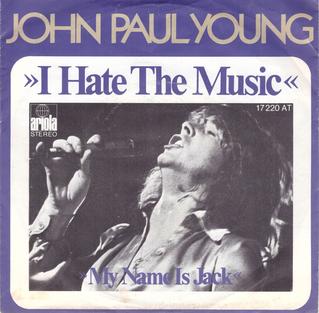
"I Hate the Music" is a pop song written by George Young and Harry Vanda and recorded by Australian pop singer John Paul Young. The song was released in March 1976 as the lead single from the singer's second studio album, J.P.Y. (1976). It peaked at number 2 on the Kent Music Report in Australia, remaining on the chart for 20 weeks. It was certified gold in Australia. It reached number 1 on the South African singles chart.

"Love an Adventure" is a song by Australian pop group Pseudo Echo. The song was released in January 1986 as the second single from their second studio album, Love an Adventure (1985). The song became the band's third Australian top ten single, peaking at number 6 on the Australian Kent Music Report.
The discography of Australian pop and jazz singer-songwriter Renée Geyer. By 1982, Geyer had five albums certified gold in Australia.
"He's My Number One" is a pop song written by Terry Britten and B. A. Robertson and recorded by Australian pop singer Christie Allen. The song was released in January 1980 as the fourth single from Allen's debut studio album, Magic Rhythm (1979). The song peaked at number 4 on the Kent Music Report in Australia.
The discography of Australian country music artist Diana Trask consists of sixteen studio albums, six compilation albums, and thirty three singles.
References
- ↑ "Single Reviews" (PDF). Cash Box . 3 January 1976. p. 9. Retrieved 21 November 2021– via World Radio History.
- ↑ Kent, David (1993). Australian Chart Book 1970–1992 (illustrated ed.). St Ives, N.S.W.: Australian Chart Book. p. 270. ISBN 0-646-11917-6.
- ↑ Kent, David (1993). Australian Chart Book 1970–1992 (illustrated ed.). St Ives, N.S.W.: Australian Chart Book. p. 427. ISBN 0-646-11917-6.
- ↑ "National Top 100 Singles for 1975". Kent Music Report. 29 December 1975. Retrieved 15 January 2022– via Imgur.